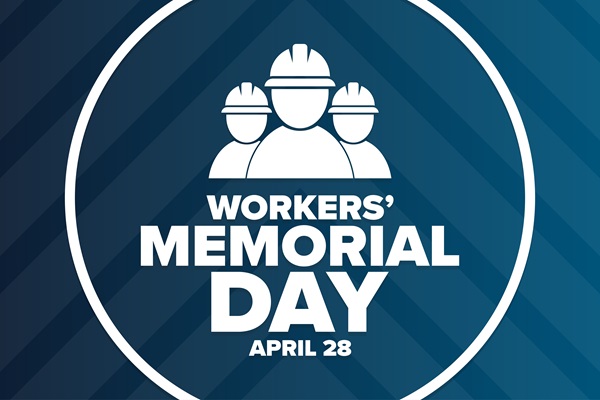Workers’ Memorial Day Pays Tribute to Fallen Workers

Every day, workers across Massachusetts and Rhode Island put their lives and health on the line to earn a living. When a serious accident occurs, the consequences can be devastating. We often hear about workers who lose their lives due to preventable accidents and work conditions. Even those who survive these accidents are out of work, collecting workers’ compensation benefits during a lengthy recovery.
Workers’ Memorial Day, observed on April 28th, was established to recognize workers who have lost their lives or suffered from work-related injuries and illnesses. It serves as a somber reminder of the importance of workplace safety and encourages us to consider ways we can all contribute to creating safer and healthier work environments.
How prevalent are worker fatalities and injuries?
In 2021, work-related injuries claimed the lives of 5,190 U.S. workers, an 8.9% increase from 2020. That’s a fatality rate of 3.6 per 100,000 full-time equivalent workers. While work-related injury fatalities are tracked by surveillance systems, most deaths resulting from work-related illnesses go unrecorded. Estimates suggest that in 2007, approximately 53,445 people died from work-related illnesses.
In 2021, employers reported around 2.6 million nonfatal injuries and illnesses to private industry workers through the annual Survey of Occupational Injuries and Illnesses. Additionally, the annual burden of chronic occupational illness in the U.S. is estimated to be between 460,534 and 709,792 additional cases.
Common causes of workplace fatalities and injuries
According to data from the Bureau of Labor Statistics, the most common causes of workplace fatalities and injuries in the United States in 2022 include:
- Transportation incidents (2,066 fatal injuries): These incidents can occur both on public roads and at the workplace and often involve vehicles such as cars, trucks, or forklifts.
- Falls, slips, and trips (865 fatal injuries): This includes falls from heights, slips on slippery surfaces, and trips over obstacles are significant contributors to workplace fatalities. These incidents can occur in a variety of work environments, from construction sites to office spaces.
- Violence and other injuries by persons or animals (849 fatal injuries): This includes homicides, assaults, and self-harm, as well as injuries caused by animals (e.g., attacks or bites).
- Exposure to harmful substances or environments (839 fatal injuries): This includes exposure to hazardous chemicals, gases, or other substances, as well as incidents involving extreme temperatures, oxygen deficiency, or other extreme environmental factors.
- Contact with objects and equipment (738 fatal injuries): This happens when workers are struck by, caught in, or crushed by objects or equipment in the workplace. Examples include being struck by a falling object, becoming entangled in machinery, or being caught between two moving objects.
- Fires and explosions (107 fatal injuries): Workplace fires and explosions can be caused by the ignition of flammable materials or an equipment malfunction.
What to do after a workplace accident
If you were injured or lost a loved one due to a workplace accident, you may be eligible for various workers’ compensation benefits, which can include:
- Medical costs for all reasonable and necessary expenses related to the work-related injury or illness, including hospital stays, doctor visits, rehabilitation, and prescription medications.
- Temporary Total Disability benefits, which provide a percentage of your average weekly wage while you are unable to work due to the injury.
- Temporary Partial Disability benefits, which provide a percentage of your wage difference if you can only work in a limited capacity due to the injury.
- Permanent Partial Disability benefits, which provide compensation for any permanent impairment resulting from the injury.
- Permanent Total Disability benefits, which provide ongoing wage replacement if the injury has rendered you permanently and totally disabled.
- Vocational benefits such as job retraining, job placement, and other services to help the injured worker return to work.
If you’re a dependent of a worker who dies due to a work-related injury or illness, you may be eligible for death benefits, which can include burial expenses and a percentage of the deceased worker’s average weekly wage.
Workers’ compensation is a no-fault system that provides benefits to injured workers or their families. The claims process can be confusing, especially if it’s your first time filing. To avoid any errors that could affect your compensation, speak to an experienced workers’ compensation lawyer at the Law Offices of Deborah G. Kohl. We can guide you through the application process and handle all aspects of your claim from start to finish. To learn more, contact us for a free consultation with one of our lawyers in Massachusetts or Rhode Island.
